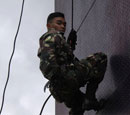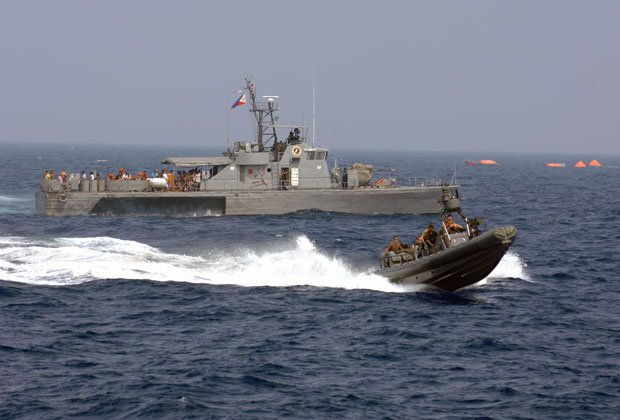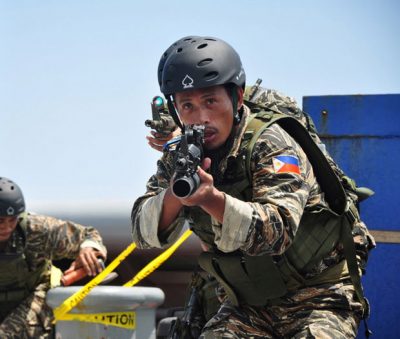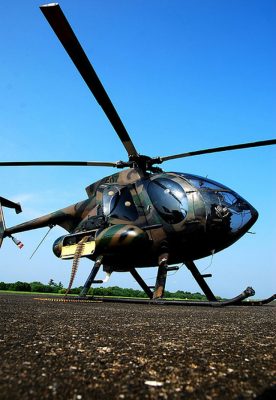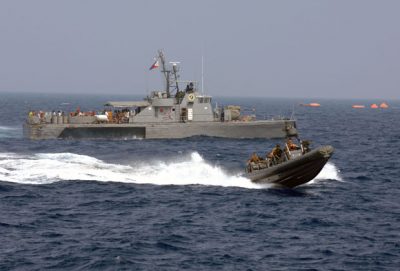RISING TENSIONS in the West Philippine Sea, also known as the South China Sea, over the disputed Spratly Islands has shed new light on an old and embarrassing fact: the country’s inability to adequately defend itself against external threats.
Armed forces?
Perhaps the most obvious manifestation of this weakness is the Armed Forces of the Philippines (AFP)’s sheer lack of equipment as compared its Asian counterparts. What little equipment the AFP has is outdated and second-hand, a far cry from being the supposed envy of the region during the late 1960s.
Jennifer Santiago-Oreta, Assistant Professor at the Political Science Department and a leading expert on the issue, assesses that the country is “the weakest link in Southeast Asian territorial defense… We really have no capability to defend ourselves externally.”
As Malaysia awaits its new submarines, Thailand shows off its aircraft carrier, and Vietnam sends its formidable navy to the disputed areas, the Philippines sends a third-hand vessel, the BRP Rajah Humabon, the navy’s flagship and a military relic from 1943, to patrol the country’s claimed part of the Spratly Islands.
Though the Philippine Navy acquired a “new” battleship last June: the BRP Gregorio del Pilar, a vessel formerly owned by the US Coast Guard, it is more than 35 years old. Even with this additional vessel, two battleships still seem desperately inadequate to protect the 7,107 Philippine islands. This lack of naval security is naturally tragic considering the nature of the country as an archipelago.
“The lack of equipment is expressed in a joke that says, ‘the Armed Forces have more senior officers than airplanes,’” says Oreta. And this is precisely why there are more goons than guns to run the country’s defenses.
The price of betrayed sovereignty
One reason that the country lacks an incentive to modernize its military is its overreliance on the US. The 1951 US–Philippine Mutual Defense Treaty requires that the two countries come to each other’s aid if one is attacked.
The Philippines also used to host the US Navy’s largest Naval Base outside the Continental United States: Subic–Clark. However, the US pullout from Subic–Clark in 1991 left the Philippine military, supposedly the sworn protector of the Filipino people, practically defenseless without the assistance of its past colonial master. The army’s “heyday,” it seems, depended primarily on American support.
This, according to Oreta, can be traced back to the time when the country was an American colony, when “the army’s predecessors [the Philippine Scouts and the Philippine Constabulary] were given the task of fighting insurgents, while the US [took] care of external defense… as the Philippines’ ‘Big Brother.’”
She believes that this culture of dependence, in turn, led to the main reason behind the underdevelopment of the AFP. The military tends turn to the US for support, sometimes even to the point of a jeopardized national sovereignty.
Internal focus, external neglect
Oreta cites another reason for the army’s questionable defensive capabilities: the army’s “internal” orientation. Currently, the AFP’s primary engagements focus on the separatist rebels in Mindanao and the more geographically spread communist rebels. She says, “Since the army’s focus is internal, why would we buy jets and boats?” Any modernization efforts would be geared toward fighting rebels, not territorial defense.
In this regard, the 1990s saw the passing of the Police Reorganization Act. The Police and Local Government Units (LGUs) were to be given the task of fighting insurgents, so that the army could focus on strengthening its external capabilities.
However, in 1998, an amendment was made to this act, once again giving the army the responsibility of fighting rebels. Oreta says that this is because of the police’s inability to handle the challenges posed by insurgents. “Back to square one,” she says.
Meryl Uy, President of the Ateneo Economics Association (AEA), agrees with Oreta’s assessment of the problem, saying, “The army’s focus has always been internal, such as fighting rebels or terrorist organizations, so there is no incentive or perceived need to buy more modern equipment such as fighter jets.”
Current steps
As the Spratlys dispute continues to escalate, the country is forced to confront the harsh effects of years of reliance on the US for its own defense. While assuring that the country is prepared in dealing with threats to sovereignty, AFP Chief-of-Staff Gen. Eduardo Oban hopes that diplomacy plays its role in the dispute.
In January 2011, President Noynoy Aquino promised a new roadmap for army modernization, Oplan Bayanihan. It was criticized, however, for upholding many of the policies that has engendered the military’s countless human rights violations under the Arroyo regime. Oplan Bayanihan promises to commit P11 billion for equipment upgrades this 2011. The plan also involves gradually passing on anti-insurgency efforts to the police and the LGUs, so that by 2013, the military could begin strengthening its external defense capabilities.
Whether the country is fighting for sovereignty over the Spratly Islands or taking down cases of corruption within the military establishment, in the end, it will take political will to arm and prepare the nation’s supposed protectors, and reject the seemingly detrimental culture of dependence on America that has been so entrenched in Philippine military.
Existing as a nation entails much—sovereignty is one. But it is one thing to have won sovereignty in a revolution more than a century ago, and still another to preserve it, either from Chinese territorial intrusion or American military meddling. The military’s guns, then, will only really matter if it can truly protect national sovereignty.
With reports from JA G. de Lima
- Photo from the Internet
- Photo from the Internet
- Photo from the Internet

